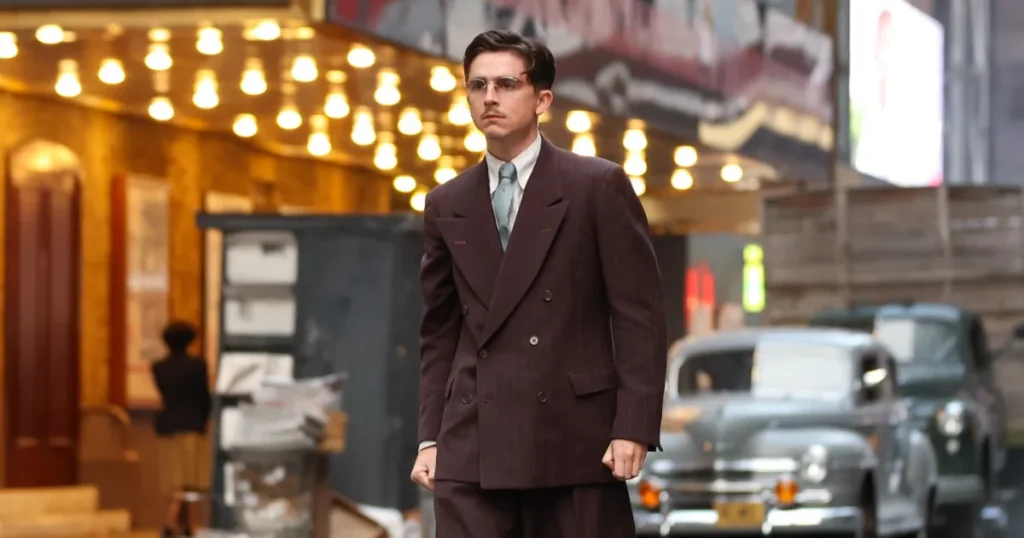Timothée Chalamet Brings the Untold Story of Ping-Pong to Life in “Marty Supreme”
This Christmas Day, audiences will experience the cinematic fusion of sports drama and period piece in A24’s “Marty Supreme,” starring Timothée Chalamet as a 1950s table tennis pioneer determined to elevate his passion from basement hobby to respected athletic pursuit. While the film isn’t a true biopic, it draws inspiration from the remarkable life of Marty Reisman, one of the most influential figures in American ping-pong history. Director Josh Safdie crafts what he calls an “homage” to Reisman rather than a biographical account, imagining an alternate timeline where table tennis achieved the mainstream popularity of its cousin sport, tennis. The film’s December 25th release strategically positions it as both a holiday family offering and potential awards season contender, with Chalamet’s transformative performance already generating buzz.
The narrative follows Marty Mauser (Chalamet), whose dreams of professional table tennis stardom seem implausible to everyone except himself. Set against the backdrop of 1950s America, the story chronicles Mauser’s relentless pursuit to legitimize ping-pong as a respectable athletic endeavor rather than merely a recreational basement pastime. Safdie, known for his intense character studies in films like “Uncut Gems,” brings his trademark energy to this sports drama, creating what he describes as a vision of “an alternative path of history where the sport did become as big as tennis.” This approach allows the filmmaker to honor the real Reisman’s ambition while taking creative liberties with historical details. The supporting cast features an eclectic mix of established stars and unexpected choices, including Gwyneth Paltrow, Fran Drescher, musician Tyler, the Creator, and surprisingly, “Shark Tank” entrepreneur Kevin O’Leary, suggesting the film will balance its sports narrative with colorful character dynamics.
The real-life inspiration behind the film, Marty Reisman, lived a story almost too cinematic to believe. Beginning his table tennis journey as a teenage hustler, Reisman would challenge opponents for money, building his skills in the underground gambling scene before transitioning to legitimate competition. At just 15 years old, he famously placed a $500 bet on himself at a national tournament in Detroit, only to discover the “bookie” was actually the head of the United States Table Tennis Association. This brushing with sports authorities became a turning point, pushing the young player toward legitimate competition and eventually international success. Reisman’s colorful personality and entrepreneurial spirit made him not just a champion but also a charismatic ambassador for the sport, qualities that clearly attracted Safdie and Chalamet to his story. Though the film takes significant creative liberties with Reisman’s biography, this foundation of a sports hustler turning legitimate champion provides rich dramatic territory.
Reisman’s actual achievements provide the inspirational backbone for the fictionalized account. After turning away from hustling, he quickly established himself as a world-class talent, capturing a bronze medal at the 1948 World Table Tennis Championships and multiple medals the following year. His competitive longevity proved remarkable as well; at 67 years old, Reisman made sporting history by becoming the oldest player ever to win an open national competition in any racket sport when he claimed the 1997 United States National Hardbat Championship. Throughout his career, he accumulated an impressive 22 table tennis titles before retiring in 2002 at age 72. Reisman remained connected to the sport until his death in 2012 at 82, serving as president of Table Tennis Nation. This extraordinary career arc—from teenage hustler to septuagenarian champion—offers the film numerous dramatic possibilities, even as it constructs its own narrative around the essence rather than the specifics of Reisman’s journey.
The production represents a notable career milestone for Chalamet, continuing his pattern of collaborating with distinctive auteur filmmakers following work with directors like Denis Villeneuve, Greta Gerwig, and Wes Anderson. His portrayal of Mauser required mastering the physical techniques of competitive table tennis while also capturing the determined spirit of a sports pioneer facing widespread skepticism. Rather than attempting a strict impersonation of Reisman, Chalamet and Safdie have indicated they focused on embodying the emotional core of a man whose passion for his sport exceeded conventional limitations. The December release positions “Marty Supreme” as both holiday entertainment and potential awards consideration, particularly for Chalamet’s performance. The involvement of A24, a studio known for distinctive and critically acclaimed films, further suggests confidence in the project’s artistic merit beyond typical sports drama conventions.
“Marty Supreme” joins a tradition of sports films that use athletic competition as a lens to examine broader social themes. Setting the story in the 1950s allows Safdie to explore postwar American culture, the establishment of new leisure activities, and possibly the commercialization of sports during television’s early expansion. The film’s exploration of legitimacy—how an activity transitions from hobby to respected competition—potentially parallels contemporary discussions about emerging sports seeking mainstream recognition. By focusing on table tennis, a sport that achieved significant popularity internationally while remaining somewhat marginalized in American sports culture, the film also examines cultural hierarchies within athletics. Whether “Marty Supreme” ultimately presents a crowd-pleasing underdog story or a more complex examination of sports, identity, and American culture remains to be seen when it reaches theaters this Christmas, but its imaginative approach to sports history offers a fresh perspective on competitive ambition and the personal sacrifices required to pioneer change.


